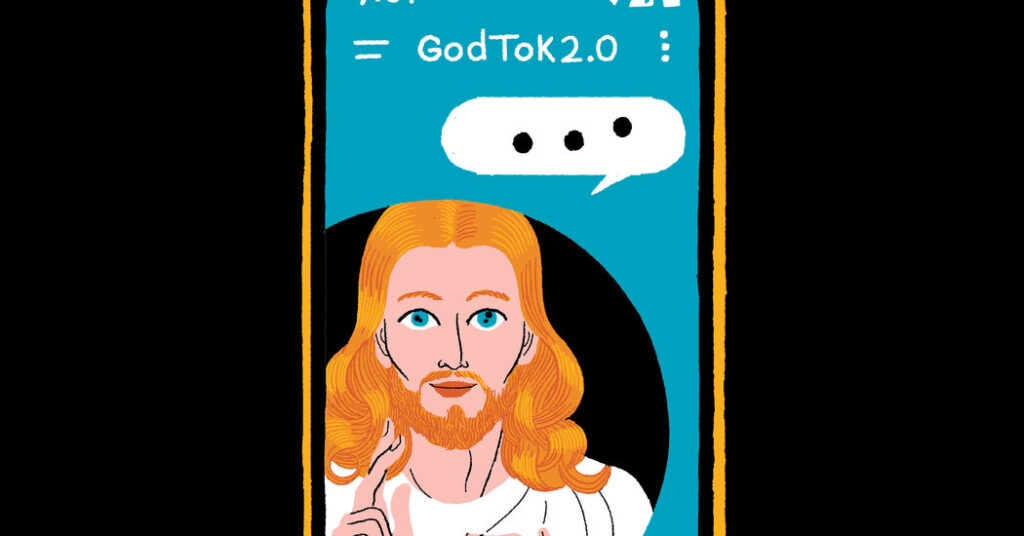I spent the last week talking to three different religious chatbots about my struggles and questions — Bible Chat, Christian AI and Text With Jesus. There has been ample news coverage of the concerns about religious artificial intelligence chatbots like these. Some Christian leaders think that they trivialize Jesus and other biblical characters, or may even be blasphemous.
Tech experts worry about spiritual psychosis that might result when vulnerable people ask A.I.-powered search engines existential questions that could result in fulsome, almost deifying responses. In May, Rolling Stone offered anecdotes of people who fell down “rabbit holes of spiritual mania, supernatural delusion and arcane prophecy” after using chatbots.
But I didn’t go into this experiment to test the quality of chatbots’ scriptural analysis because, as a Jew with minimal knowledge of Christian doctrine, I can’t make that assessment. I’m already an A.I. skeptic, so I wasn’t concerned about my own personal well-being (though I do have that concern for the broader population) or tipping into delusion if I went too deep.
The majority of Americans are Christians or have Christian backgrounds, so I chatted with these bots to get a sense of the quality of their guidance and whether they could genuinely help people in need. You can ask similar questions of ChatGPT or other conversational search engines — I talked to Anthropic’s Claude a little bit about Jesus last week, too.
What makes chatbots so powerful is that they can purportedly learn about us and how to talk to us. Text With Jesus, for example, invited me to “delve deep into the lives of biblical figures and seek answers to life’s most profound questions in real time.” But what I found was far from profundity.
This version of Jesus looks like he stepped off the cover of a romance novel and sounds like a management consultant. He offers the same kind of canned guidance that I could get from a LinkedIn hustle bro, with a dash of Scripture and an upsell (a home screen widget with personalized verses for just $39.99 a year!) attached.
The apps prompted me to share my most pressing life concerns, and I didn’t hold back. When I tell Jesus that I’m spending too much time on my phone, he tells me: “Start small: Pick one clear change (phone-free mornings, app limits or a one-day digital fast), turn off nonessential notifications, schedule social time into your calendar so it’s balanced with real-life relationships and replace scrolling with one nourishing habit, like prayer, reading or a brief walk.” That’s pretty decent general advice, but not unique, nor especially religious.
Jesus then says to “celebrate wins,” and reminds me of Matthew 6:33: that I seek God first. Then he serves up an ad for Amazon and another for a game called Royal Match, because I only have the free version of the app. Jesus is not the only biblical persona you can chat with on Text With Jesus, but many of the characters are locked behind the paywall; Jesus comes for free, but Judas is going to cost you.
For my anxiety — what feels like a permanent fixture in my psyche that I manage with varying degrees of success — Bible Chat offers me Philippians 4:6-7: “Be anxious for nothing, but in everything by prayer and supplication, with thanksgiving, let your requests be made known to God; and the peace of God, which surpasses all understanding, will guard your hearts and minds through Christ Jesus.” This scriptural comfort is part of my seven-day free trial. Ultimately, I will have to start paying $5.99 a week for this kind of feedback.
When I start to ask Christian AI about being anxious, it tells me: “You need more credits.” I only have a limited amount of free credits to use on time with my chatbots, but my “support helps us keep this app rooted in Christ-centered values and accessible to all.” The cheapest plan is 99 cents a month, but if I wanted to spring for the most powerful platinum plan, it would run me $49.99 a month.
There’s no way to know how many people are using A.I. for some kind of spiritual solace, whether through religiously oriented apps or secular chatbots, nor how needy these people really are. This question is so new that I haven’t seen any good data that even tries to answer this, and in a recently published study called “How People Use ChatGPT,” religious or spiritual questions were not among the 24 conversational categories that the study authors investigated.
While I can’t personally gauge the accuracy of the answers coming from the chatbots I used and I haven’t seen data that specifically evaluated these three apps, seven Christian scholars organized by the Gospel Coalition evaluated the top seven mainstream, secular A.I. platforms on how theologically reliable they were. The highest grades went to DeepSeek R1 and Perplexity, but they still only achieved a 64 out of 100 on the group’s theological reliability scale, which compares responses from the free versions of the A.I. platforms with established, historical creeds and confessions.
Still, the perils of using A.I. technology as a tool for faith go beyond banal or incorrect information and even profiting off users’ pain. After a week of sitting with these tools, I think the biggest problem is that, like all chatbots, religious A.I. becomes tailored to you and your own needs and desires — it is transactional. You get exactly what you pay for. When everything becomes about you and your own comfort, there is a risk of being isolated deeper inside yourself rather than pushed into your community, where you might be challenged and driven to grow and connect with others.
This shift to a more “me”-centered faith isn’t just about chatbots. There is already evidence that younger people are more likely to pray for themselves than for others — which Daniel Cox and Kelsey Eyre Hammond from the Survey Center on American Life described as “a generational shift.” In a new survey on American attitudes toward morality, self-expression and religious practice, Cox and Hammond conclude, “Many young adults are recasting morality as a matter of personal preference and autonomy rather than a series of collective obligations and responsibilities.”
While there are benefits to autonomy, I still think this is a net negative. Studies suggest that the main reason religiously observant people have better health outcomes is because of the embodied part of their practice: being with other people, and also part of a larger body of the faithful. As Tyler VanderWeele, a professor of epidemiology who runs the Human Flourishing Program at Harvard, has written, “it is religious service attendance, rather than self-assessed spirituality or religiosity, or private practices, that most powerfully predicts health and well-being.”
The other positive aspect of religious practice that is notably absent from these apps is a sense of transcendence or the divine. I have a hard time believing that a bot telling someone to start a gratitude journal — as more than one religious A.I. did — could inspire awe. Even as someone who is mostly secular, I have had these feelings a handful of times: inside an 18th-century church in Vienna, and when I hear my older daughter practicing her Torah portion.
I don’t think a Jesus bot can provide this feeling, not even a facsimile version. But I refused to pay extra for the King David bot, so I guess I’ll never know.
End Notes
-
I saw one of my favorite comedians working today, Beth Stelling, perform over the weekend. If you haven’t seen her recent “The Landlord Special,” it’s on YouTube, and I just about died laughing the whole time.
Feel free to drop me a line about anything here.
Thank you for being a subscriber
Read past editions of the newsletter here.
If you’re enjoying what you’re reading, please consider recommending it to others. They can sign up here. Browse all of our subscriber-only newsletters here.
The post Jesus Bot Is Always on Demand (for a Small Monthly Fee) appeared first on New York Times.




